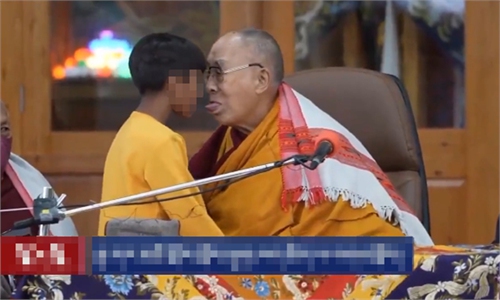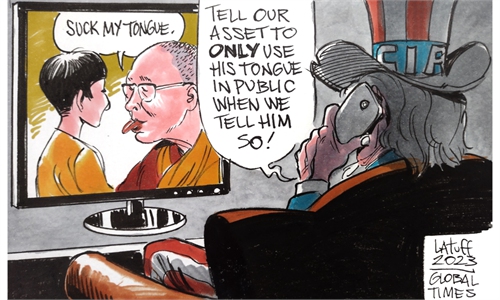More than tongue-sucking scandal, it’s time to see through 14th Dalai Lama’s illusive moral icon image
How can people tolerate the obscene behavior of an adult man asking a young boy to "suck my tongue" in front of the world?
It seems the 14th Dalai Lama is likely to get away with his most recent scandal under the protection of numerous Western media sources, which have hurriedly whitewashed the monk's obvious impropriety toward an innocent child, an action that has led many to question the sanitized image of the so-called spiritual leader. But this line of questioning goes far beyond the monk's public impropriety.
For a long time, the Western world and the Dalai himself have rebranded and glorified the man behind the mythical "spiritual leader" title. Many overseas Tibetans and ordinary people in the West have been blinded, believing whatever the 14th Dalai Lama declares to represent justice, said Zhu Weiqun, former head of the Ethnic and Religious Affairs Committee of the National Committee of the Chinese People's Political Consultative Conference.
The Western media machine, while promoting Dalai Lama to the status of an icon, have been purposefully ignoring the truth that old Xizang society was one riddled with oppression. The Dalai Lama is a separatist leader and has used his influence to instigate terrorist events in China, breaking real peace and stability in China's Xizang Autonomous Region, according to Zhu.
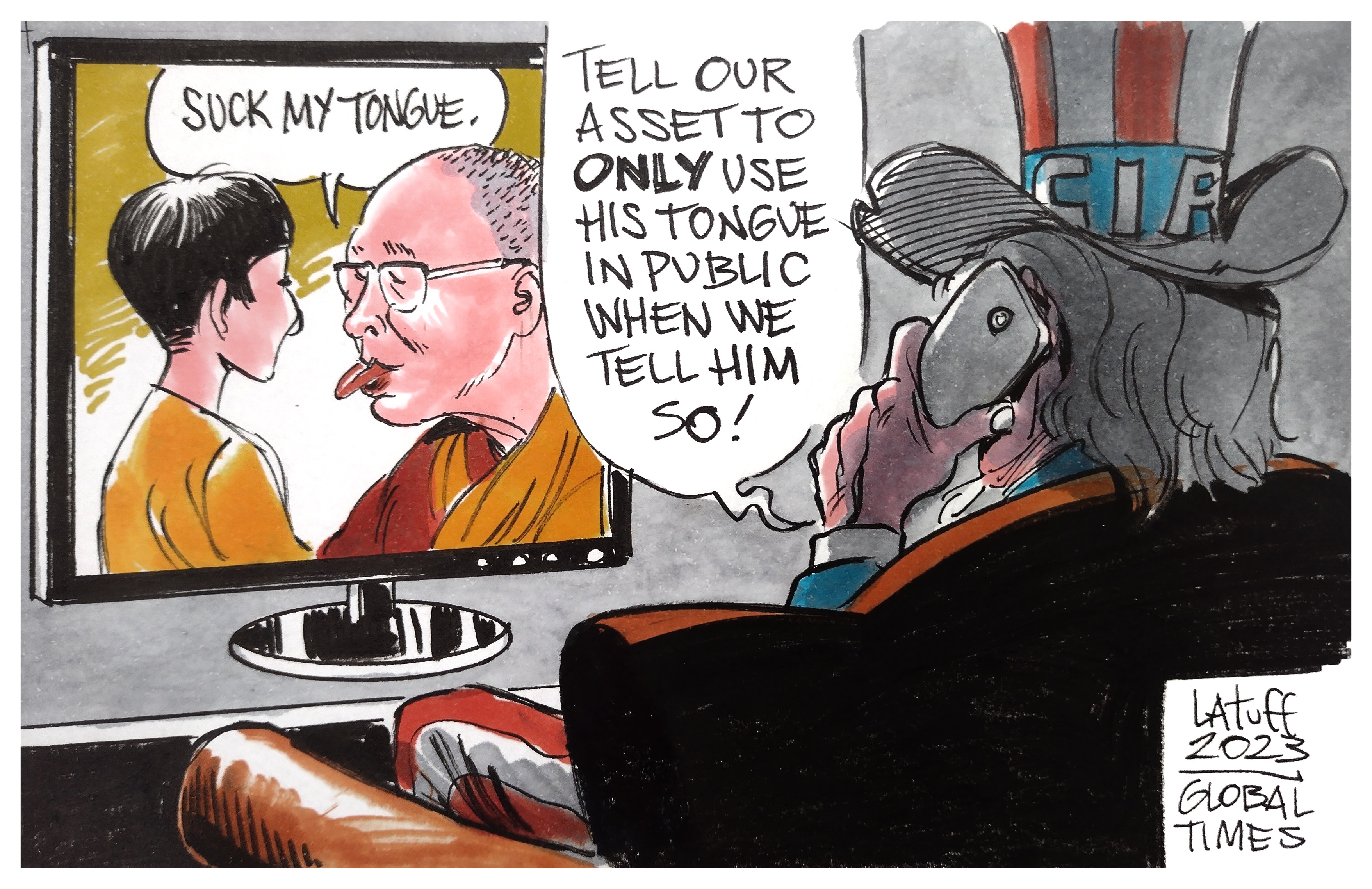
Clumsy coverups
The recent viral video showing the 14th Dalai Lama kissing a child on the lips and then asking the boy to suck his tongue at an event in India unsurprisingly shocked the world due to its disturbing and disgusting nature. In the video, the 87-year-old invites the boy onto the stage, after which he pulled the boy's chin, kissing him on the lips, and says "And suck my tongue," before sticking out his tongue. The Dalai Lama then apologized after the video clip went viral.
However, certain major Western media outlets have chosen to sweep the monk's behavior under the carpet. A BBC article even hinted that the Dalai Lama's actions were linked to Tibetan culture.
"Sticking one's tongue out can be a form of greeting in Tibet," read the article. It explained the disturbing display as being part of ancient Tibetan traditions dating back to the 9th century.
Many other Western media outlets joined the BBC to justify his disturbing deed. An article from the Independent newspaper said that "sticking out your tongue is traditionally a sign of respect or agreement and has also been used as a greeting in Tibetan culture, according to the Institute of East Asian Studies at the University of California, Berkeley."
But these rushed coverups are easily proved clumsy.
"The so-called tongue greeting in Tibetan culture is to express awe from an inferior to his superior," Xiao Jie, deputy director at the Institute of Contemporary Studies of the China Tibetology Research Center, told the Global Times on Wednesday.
"From the perspective of any culture in the world, the Dalai Lama's behavior is improper," Xiao noted. "It is not his personal humor either. No man would do this to a kid at a formal occasion, especially when his identity is a Buddhist monk delivering lessons. It is very frivolous."
In response to the "whitewashing" campaigns to defend the Dalai Lama, some Western journalists also pointed out the absurdity of these justifications.
British Talk TV's presenter Julia Hartley-Brewer said in a Twitter post, "Er... since when was it funny when a powerful old man tells a young boy to 'suck my tongue'? Why are all the men laughing? This is so creepy."
Under a post from The Herald Post, a Twitter user commented, "Why share the video? The words would have been enough. You know that it is not only that it is disturbing, but…WRONG. The system is rigged for predators. Is your media system full of predators too? Why spread CHILD abuse online?"
The Survivors Network of Those Abused by Priests, an independent, peer network of survivors of institutional sexual abuse and their supporters, said in a statement, "We are as horrified as any viewer by the actions of the Dalai Lama. Our primary concern is with the innocent boy who was the subject of this disgusting request by a revered spiritual figure," according to a Daily Mail article published on April 11, 2023.
"Additionally, it is just as disturbing to read the minimizing statement released on behalf of Buddhist enlightenment," the statement continued in the article.
Ignoring facts
"This has been more than the Dalai Lama's personal ugly behavior, but the fact is that he has been mentally oppressing, destroying, and deceiving overseas Tibetans and believers for a long time, turning them into a part of his political power in his activities," Zhu said. "He is very good at - by using religion as a cover - maintaining his image of 'morality, holiness, and purity.'"
However, the bygone Xizang that the Dalai Lama used to rule was a backward and cruel serfdom society.
Before the democratic reform in 1959, there were 197 hereditary aristocratic families, and the few top families each possessed dozens of manors and thousands of hectares of land. The family of the 14th Dalai Lama owned 27 manors, 30 pastures, and over 6,000 serfs. The Dalai Lama alone owned 160,000 taels (one tael is equal to 30 grams) of gold, 95 million taels of silver, over 20,000 pieces of jewelry and jade ware, and more than 10,000 pieces of silk clothing and rare furs.
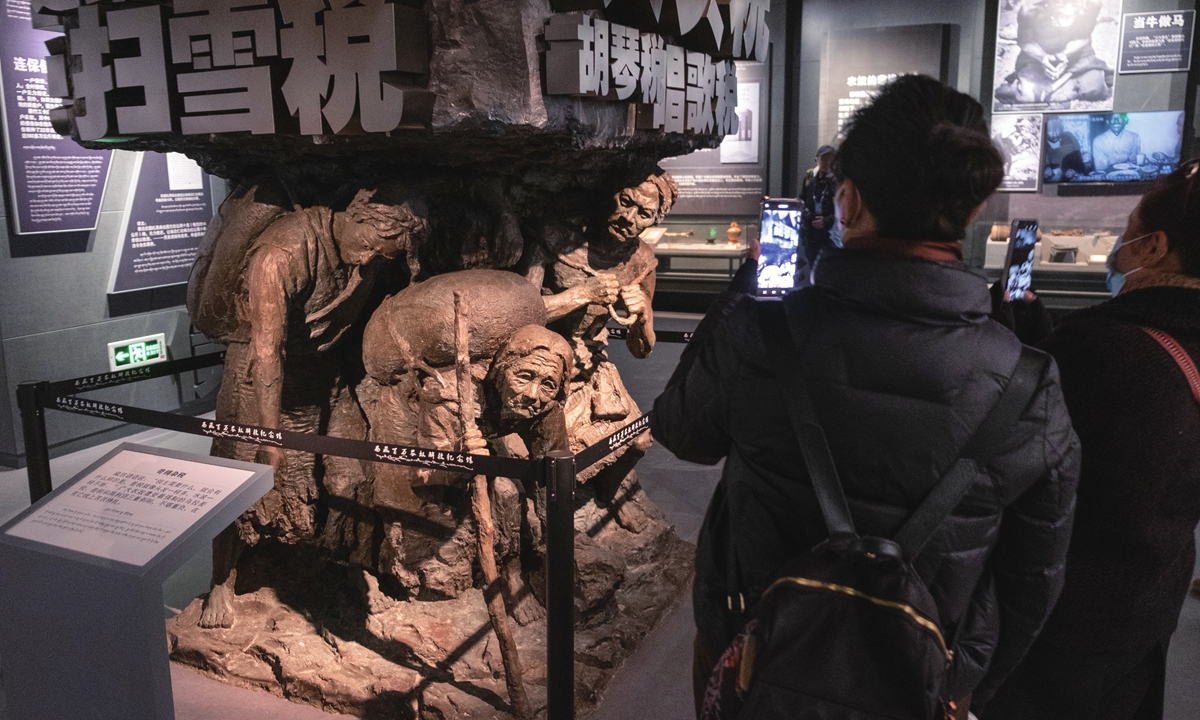
In 1959, there were 197 hereditary aristocratic families in Xizang, with each family owning from several hundred to tens of thousands of acres of land. These aristocrats enjoyed a life of ease and luxury, ordering groups of serfs around, while common serfs lived in squalor and had to resort to eating rancid peas and gruel for sustenance.
In March 1959, the central government led the people in Xizang to launch the democratic reform, abolishing Xizang's feudal serfdom under a theocracy. In 2009, the regional legislature announced March 28 as a day to commemorate the emancipation of about 1 million serfs.
During the dark history of old Xizang, human bones and skulls were used as ornaments in Tibetan Buddism and the lives of serfs were easily abused.
A letter from the Xizang local government department to the head of a Rabden (a theocratic and administrative organization at a lower level) in the early 1950s contains instructions in relation to the celebration of the 14th Dalai Lama's birthday, which said that all the staff of Lower Tantric College would chant the sutra on the occasion, and "during the service, food will be offered to the hungry ghosts, for which a corpus of fresh intestines, two skulls, some mixed blood, and a whole human skin are urgently needed. Have these delivered without delay."
The 14th Dalai Lama, who fiddles with politics under the guise of religion, waywardly fanned the flames of instability in the Xizang region and sought to impede the order of Tibetan Buddhism.
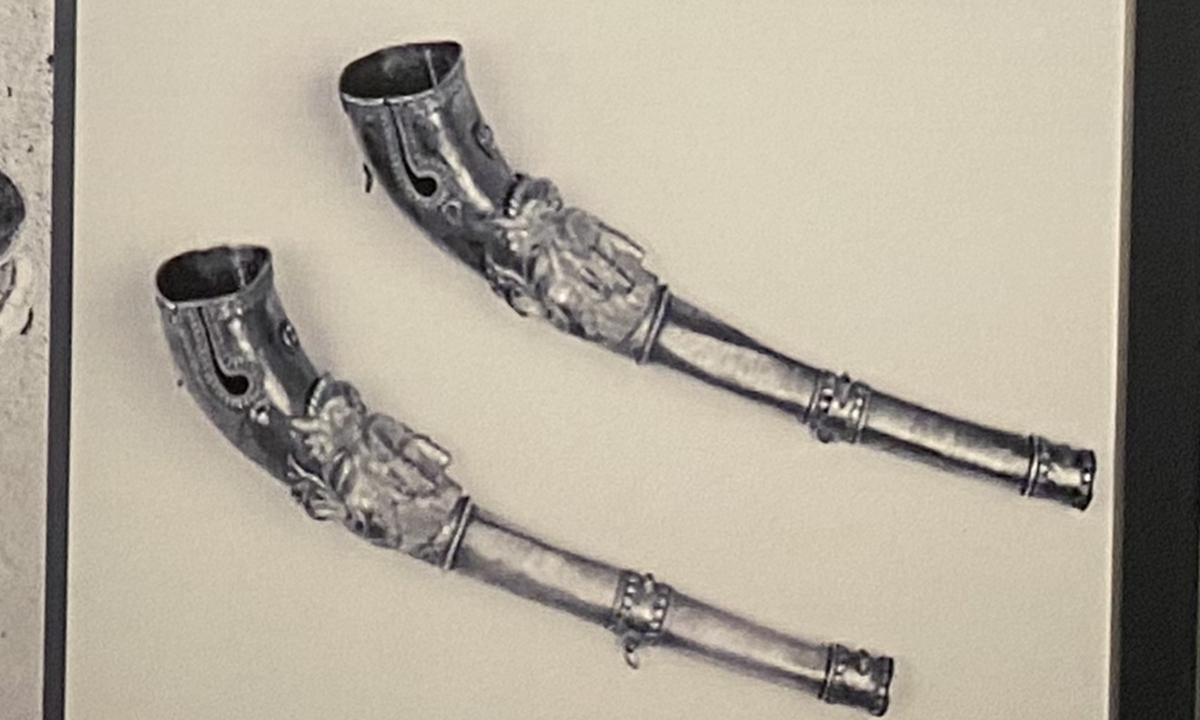
In 2008, for instance, he used his influence to instigate violence and secessionist activities in the region. The tragedy that occurred in Lhasa on March 14, 2008 saw a dozen innocent locals either immolated, beheaded, or asphyxiated, while police on patrol were assaulted. On the very day of the riot, the 14th Dalai Lama himself said he held in esteem the desires of Tibetans in what they did and would not like to let them halt.
Globally, the Dalai Lama doesn't have the purest of records. His most recent scandal is far from the first controversy the polarizing figure has courted. For instance, in 2019, he was mired in a sexism scandal when he told the BBC that his future successor can be a woman but must be "very attractive." Otherwise, she would not be of much use, he said. He also made the sexist insinuation that people would prefer not see her if she were unattractive.
According to a report of the Swiss newspaper Neue Zuercher Zeitung, in the 1960s, about 200 Tibetan infants were taken from their parents and sent to Switzerland for adoption through a Swiss businessman in collusion with the 14th Dalai Lama, claiming that these children were orphans. His actions violated common ethics and morality, trampled on the children's rights, and is deplorable to every person with a sense of justice.
It was also reported that in 2019, the Dalai Lama received $1 million to endorse a controversial "sex cult" which brainwashes and brands women, read the Daily Mail article.
Real nature of Dalai clique
Regarding this scandal, Western society, especially some Western media, has shown consistent double standards. And there is a reason for that.
Xiao said that in 1980s and 1990s, Western society crafted an image around the 14th Dalai Lama as "a wise man" to fulfill people's prejudiced and ignorant observation with the "mysterious oriental world" and as a bid to heal social problems in the Western societies.
"With growing changes in the international society and strained China-US relations, the Dalai Lama's role as a political tool to contain China has become increasingly important," Xiao noted. "However, the golden period of using him to contain China has already passed, and Western society now focuses more on covering negative news about him."
Li Decheng, director of the Tibetology Research Center, told the Global Times that it is well known that the Dalai group headed by the 14th Dalai Lama is a separatist political clique that represents the remnants of the feudal serf owners' class under the theocracy of old Xizang and this secessionist clique is used by hostile international forces to undermine the development and stability of Tibetan communities in China, and seeks for so-called Tibetan independence.
The fundamental purpose of all the activities undertaken by the Dalai clique is to seek to split the motherland, rather than what it has claimed to be for the "well-being of the Tibetan people," Li said.
Although the Dalai Lama and his clique often change their tactics, their real political intention has never changed. In essence, the Dalai clique is nothing more than a separatist political group that has long been engaged in secessionist and destructive activities, harming China and the interests of Chinese people, he stressed.
It seems the 14th Dalai Lama is likely to get away with his most recent scandal under the protection of numerous Western media sources, which have hurriedly whitewashed the monk's obvious impropriety toward an innocent child, an action that has led many to question the sanitized image of the so-called spiritual leader. But this line of questioning goes far beyond the monk's public impropriety.
For a long time, the Western world and the Dalai himself have rebranded and glorified the man behind the mythical "spiritual leader" title. Many overseas Tibetans and ordinary people in the West have been blinded, believing whatever the 14th Dalai Lama declares to represent justice, said Zhu Weiqun, former head of the Ethnic and Religious Affairs Committee of the National Committee of the Chinese People's Political Consultative Conference.
The Western media machine, while promoting Dalai Lama to the status of an icon, have been purposefully ignoring the truth that old Xizang society was one riddled with oppression. The Dalai Lama is a separatist leader and has used his influence to instigate terrorist events in China, breaking real peace and stability in China's Xizang Autonomous Region, according to Zhu.

After decades of channeling funds to the Dalai Lama, a moment of a buyer's remorse for the US? Cartoon: Carlos Latuff
Clumsy coverups
The recent viral video showing the 14th Dalai Lama kissing a child on the lips and then asking the boy to suck his tongue at an event in India unsurprisingly shocked the world due to its disturbing and disgusting nature. In the video, the 87-year-old invites the boy onto the stage, after which he pulled the boy's chin, kissing him on the lips, and says "And suck my tongue," before sticking out his tongue. The Dalai Lama then apologized after the video clip went viral.
However, certain major Western media outlets have chosen to sweep the monk's behavior under the carpet. A BBC article even hinted that the Dalai Lama's actions were linked to Tibetan culture.
"Sticking one's tongue out can be a form of greeting in Tibet," read the article. It explained the disturbing display as being part of ancient Tibetan traditions dating back to the 9th century.
Many other Western media outlets joined the BBC to justify his disturbing deed. An article from the Independent newspaper said that "sticking out your tongue is traditionally a sign of respect or agreement and has also been used as a greeting in Tibetan culture, according to the Institute of East Asian Studies at the University of California, Berkeley."
But these rushed coverups are easily proved clumsy.
"The so-called tongue greeting in Tibetan culture is to express awe from an inferior to his superior," Xiao Jie, deputy director at the Institute of Contemporary Studies of the China Tibetology Research Center, told the Global Times on Wednesday.
"From the perspective of any culture in the world, the Dalai Lama's behavior is improper," Xiao noted. "It is not his personal humor either. No man would do this to a kid at a formal occasion, especially when his identity is a Buddhist monk delivering lessons. It is very frivolous."
In response to the "whitewashing" campaigns to defend the Dalai Lama, some Western journalists also pointed out the absurdity of these justifications.
British Talk TV's presenter Julia Hartley-Brewer said in a Twitter post, "Er... since when was it funny when a powerful old man tells a young boy to 'suck my tongue'? Why are all the men laughing? This is so creepy."
Under a post from The Herald Post, a Twitter user commented, "Why share the video? The words would have been enough. You know that it is not only that it is disturbing, but…WRONG. The system is rigged for predators. Is your media system full of predators too? Why spread CHILD abuse online?"
The Survivors Network of Those Abused by Priests, an independent, peer network of survivors of institutional sexual abuse and their supporters, said in a statement, "We are as horrified as any viewer by the actions of the Dalai Lama. Our primary concern is with the innocent boy who was the subject of this disgusting request by a revered spiritual figure," according to a Daily Mail article published on April 11, 2023.
"Additionally, it is just as disturbing to read the minimizing statement released on behalf of Buddhist enlightenment," the statement continued in the article.
Ignoring facts
"This has been more than the Dalai Lama's personal ugly behavior, but the fact is that he has been mentally oppressing, destroying, and deceiving overseas Tibetans and believers for a long time, turning them into a part of his political power in his activities," Zhu said. "He is very good at - by using religion as a cover - maintaining his image of 'morality, holiness, and purity.'"
However, the bygone Xizang that the Dalai Lama used to rule was a backward and cruel serfdom society.
Before the democratic reform in 1959, there were 197 hereditary aristocratic families, and the few top families each possessed dozens of manors and thousands of hectares of land. The family of the 14th Dalai Lama owned 27 manors, 30 pastures, and over 6,000 serfs. The Dalai Lama alone owned 160,000 taels (one tael is equal to 30 grams) of gold, 95 million taels of silver, over 20,000 pieces of jewelry and jade ware, and more than 10,000 pieces of silk clothing and rare furs.

Visitors view a sculpture showing the miserable life of serfs in old Xizang in the Tibet Museum in Lhasa, Southwest China's Xizang Autonomous Region. Photo: VCG
In 1959, there were 197 hereditary aristocratic families in Xizang, with each family owning from several hundred to tens of thousands of acres of land. These aristocrats enjoyed a life of ease and luxury, ordering groups of serfs around, while common serfs lived in squalor and had to resort to eating rancid peas and gruel for sustenance.
In March 1959, the central government led the people in Xizang to launch the democratic reform, abolishing Xizang's feudal serfdom under a theocracy. In 2009, the regional legislature announced March 28 as a day to commemorate the emancipation of about 1 million serfs.
During the dark history of old Xizang, human bones and skulls were used as ornaments in Tibetan Buddism and the lives of serfs were easily abused.
A letter from the Xizang local government department to the head of a Rabden (a theocratic and administrative organization at a lower level) in the early 1950s contains instructions in relation to the celebration of the 14th Dalai Lama's birthday, which said that all the staff of Lower Tantric College would chant the sutra on the occasion, and "during the service, food will be offered to the hungry ghosts, for which a corpus of fresh intestines, two skulls, some mixed blood, and a whole human skin are urgently needed. Have these delivered without delay."
The 14th Dalai Lama, who fiddles with politics under the guise of religion, waywardly fanned the flames of instability in the Xizang region and sought to impede the order of Tibetan Buddhism.

Religious artifacts made from slave's calf bones Photo: Courtesy of the Tibet Museum
In 2008, for instance, he used his influence to instigate violence and secessionist activities in the region. The tragedy that occurred in Lhasa on March 14, 2008 saw a dozen innocent locals either immolated, beheaded, or asphyxiated, while police on patrol were assaulted. On the very day of the riot, the 14th Dalai Lama himself said he held in esteem the desires of Tibetans in what they did and would not like to let them halt.
Globally, the Dalai Lama doesn't have the purest of records. His most recent scandal is far from the first controversy the polarizing figure has courted. For instance, in 2019, he was mired in a sexism scandal when he told the BBC that his future successor can be a woman but must be "very attractive." Otherwise, she would not be of much use, he said. He also made the sexist insinuation that people would prefer not see her if she were unattractive.
According to a report of the Swiss newspaper Neue Zuercher Zeitung, in the 1960s, about 200 Tibetan infants were taken from their parents and sent to Switzerland for adoption through a Swiss businessman in collusion with the 14th Dalai Lama, claiming that these children were orphans. His actions violated common ethics and morality, trampled on the children's rights, and is deplorable to every person with a sense of justice.
It was also reported that in 2019, the Dalai Lama received $1 million to endorse a controversial "sex cult" which brainwashes and brands women, read the Daily Mail article.
Real nature of Dalai clique
Regarding this scandal, Western society, especially some Western media, has shown consistent double standards. And there is a reason for that.
Xiao said that in 1980s and 1990s, Western society crafted an image around the 14th Dalai Lama as "a wise man" to fulfill people's prejudiced and ignorant observation with the "mysterious oriental world" and as a bid to heal social problems in the Western societies.
"With growing changes in the international society and strained China-US relations, the Dalai Lama's role as a political tool to contain China has become increasingly important," Xiao noted. "However, the golden period of using him to contain China has already passed, and Western society now focuses more on covering negative news about him."
Li Decheng, director of the Tibetology Research Center, told the Global Times that it is well known that the Dalai group headed by the 14th Dalai Lama is a separatist political clique that represents the remnants of the feudal serf owners' class under the theocracy of old Xizang and this secessionist clique is used by hostile international forces to undermine the development and stability of Tibetan communities in China, and seeks for so-called Tibetan independence.
The fundamental purpose of all the activities undertaken by the Dalai clique is to seek to split the motherland, rather than what it has claimed to be for the "well-being of the Tibetan people," Li said.
Although the Dalai Lama and his clique often change their tactics, their real political intention has never changed. In essence, the Dalai clique is nothing more than a separatist political group that has long been engaged in secessionist and destructive activities, harming China and the interests of Chinese people, he stressed.
